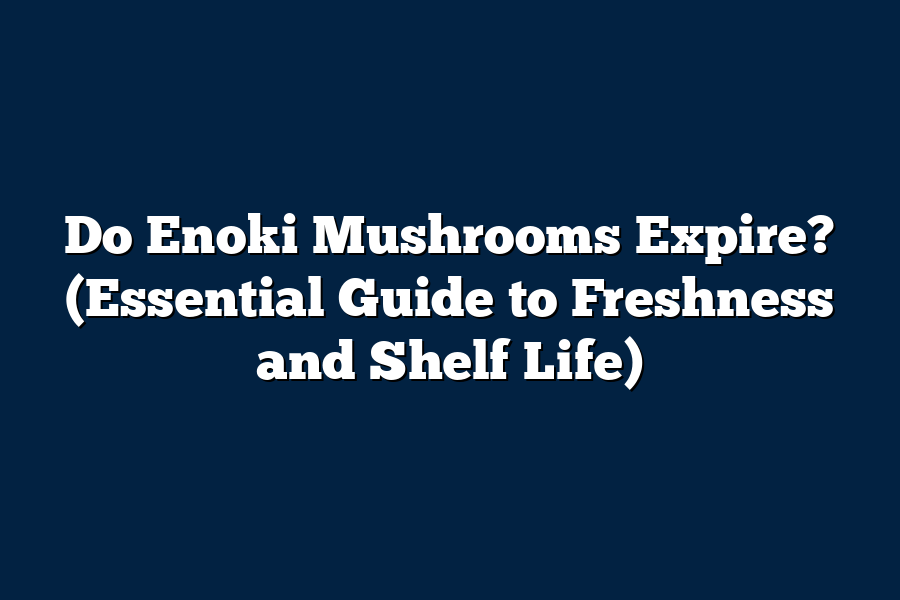Enoki mushrooms have a relatively short shelf life compared to other mushroom varieties. They typically last for about one week when stored properly in the refrigerator. To prolong their freshness, it’s best to store them in a paper bag in the refrigerator and consume them before they start to turn slimy or develop a foul odor. If you notice any signs of spoilage, such as discoloration or a mushy texture, it’s best to discard them to avoid any potential food safety issues.
Hello, mushroom lovers!
Ever wondered how long those ethereal enoki mushrooms last in your fridge?
Today, we’re uncovering the secrets of their shelf life.
Join me as we explore expiry factors, spoilage signs, and storage tips for these delicate fungi.
Let’s dive in!
Table of Contents
Factors Affecting the Expiration of Enoki Mushrooms
When it comes to the expiration of enoki mushrooms, various factors come into play that determine their shelf life.
Understanding these factors can help you better store and use your enoki mushrooms to ensure freshness and quality.
Let’s delve into the key aspects influencing the expiration of these delicate mushrooms:
1. Storage Conditions
The way you store your enoki mushrooms plays a significant role in how long they stay fresh.
Here are some essential storage tips to consider:
- Temperature: Enoki mushrooms should be stored in the refrigerator at around 34-38°F (1-3°C) to maintain freshness.
- Humidity: These mushrooms prefer a slightly humid environment, so placing them in a damp paper towel or perforated plastic bag can help retain moisture.
- Airflow: Providing proper airflow can prevent moisture buildup, which can lead to spoilage. Avoid sealing enoki mushrooms in airtight containers.
2. Packaged vs. Loose
The packaging of enoki mushrooms can impact their expiration date.
Here’s how:
- Packaged Enoki Mushrooms: Pre-packaged mushrooms may have a shorter shelf life due to limited airflow. Be sure to check the expiration date on the package.
- Loose Enoki Mushrooms: If you buy loose enoki mushrooms, you can transfer them to a paper bag or open container to promote better air circulation and extend their freshness.
3. Quality at Purchase
The quality of enoki mushrooms when you purchase them can affect how long they last.
Look for the following signs of freshness:
- Appearance: Choose mushrooms that are firm, bright white, and free from discoloration or sliminess.
- Smell: Fresh enoki mushrooms should have a mild, earthy aroma. Avoid mushrooms with a strong or unpleasant smell.
4. Contamination Risk
Enoki mushrooms are susceptible to contamination, which can hasten spoilage.
To minimize the risk of contamination:
- Inspect for Mold: Check for any signs of mold growth on the mushrooms. If you spot mold, discard the affected mushrooms.
- Separation: Store enoki mushrooms away from raw meats and other potential sources of contamination in the refrigerator.
By paying attention to these factors and adopting proper storage practices, you can extend the shelf life of your enoki mushrooms and enjoy them at their best.
Stay tuned for more tips on maximizing the freshness of these delicate fungi!
Signs of Spoilage in Enoki Mushrooms
Enoki mushrooms are a delicate and flavorful addition to many dishes, but like any perishable food item, they can spoil if not stored or handled properly.
Here are some key signs to look out for to determine if your enoki mushrooms have gone bad:
1. Discoloration:
One of the most obvious signs of spoilage in enoki mushrooms is discoloration.
Fresh enoki mushrooms should have a bright white color, but if you notice any dark spots, slimy patches, or a yellow or brown tint, it’s best to discard them.
2. Slimy Texture:
Healthy enoki mushrooms have a crisp and firm texture.
If you touch your enoki mushrooms and they feel slimy or mushy, it’s a clear indicator that they have started to spoil due to excess moisture.
3. Unpleasant Odor:
Enoki mushrooms should have a mild and earthy aroma.
If you detect a strong, foul smell coming from your enoki mushrooms, it’s a sign that they have gone bad and should not be consumed.
4. Slimy Stems:
The stems of enoki mushrooms are particularly prone to spoilage.
If the stems appear slimy or have a soft, spongy texture, it’s a sure sign that the mushrooms are past their prime.
5. Mold Growth:
The presence of mold is a definite indicator that enoki mushrooms have spoiled.
If you notice any fuzzy patches or visible mold growth on your mushrooms, it’s crucial to discard them immediately to avoid any foodborne illnesses.
6. Wrinkled Caps:
Healthy enoki mushroom caps should be smooth and taut.
If you observe any wrinkling or shriveling on the caps, it’s a sign that the mushrooms are dehydrated and have lost their freshness.
:
By being vigilant and paying attention to these key signs of spoilage in enoki mushrooms, you can ensure that you always use fresh and safe ingredients in your cooking.
Remember, when in doubt, it’s best to err on the side of caution and discard any mushrooms that show signs of spoilage.
Best Practices for Storing Enoki Mushrooms to Maintain Freshness
Are you a fan of enoki mushrooms and want to make sure you always have a fresh supply on hand?
Proper storage is key to maintaining the quality and freshness of these delicate fungi.
Let’s dive into the best practices to store enoki mushrooms effectively.
1. Choose the Right Packaging
When it comes to storing enoki mushrooms, the first step is to choose the right packaging.
Opt for a breathable container, such as a paper bag or a perforated plastic bag.
This allows air to circulate around the mushrooms, preventing moisture buildup that can lead to spoilage.
2. Refrigerate Promptly
After purchasing or harvesting fresh enoki mushrooms, refrigerate them promptly to extend their shelf life.
Place the mushrooms in the crisper drawer of your refrigerator, where the temperature is slightly cooler and more consistent.
3. Avoid Moisture
Enoki mushrooms are prone to moisture absorption, which can cause them to become slimy and develop mold.
To prevent this, avoid washing the mushrooms before storage.
Instead, wipe them gently with a damp paper towel to remove any debris.
4. Store Separately
To prevent cross-contamination and maintain the quality of your enoki mushrooms, store them separately from other produce in your refrigerator.
This helps to avoid any transfer of odors or moisture that could impact the mushrooms’ freshness.
5. Check Regularly
Make it a habit to check on your stored enoki mushrooms regularly.
Remove any mushrooms that show signs of spoilage, such as discoloration, sliminess, or a foul odor.
This helps prevent the spread of spoilage to the rest of the batch.
6. Use within a Week
While enoki mushrooms can last for up to two weeks when stored properly, it’s best to use them within a week for optimal freshness and flavor.
Incorporate these mushrooms into your meals throughout the week to enjoy them at their best.
By following these best practices for storing enoki mushrooms, you can ensure that your supply remains fresh and flavorful for longer.
Incorporate these tips into your routine to make the most of these delicate mushrooms in your culinary creations.
Identifying Bad Enoki Mushrooms – When to Discard
Enoki mushrooms are a delicate and flavorful addition to many dishes, but like all perishable foods, they can go bad.
Knowing how to identify when enoki mushrooms have expired is crucial to avoid food poisoning and maintain the quality of your meals.
Changes in Appearance
One of the first signs that enoki mushrooms are no longer safe to eat is changes in their appearance.
Look out for the following visual cues:
- Slimy Texture: If the mushrooms feel slimy or slippery to the touch, it’s a clear indication that they have started to spoil.
- Discoloration: Any dark spots, browning, or discoloration on the mushrooms indicate that they are past their prime.
- Mold Growth: Visible mold growth on the mushrooms is a definite sign that they have spoiled and should be discarded immediately.
Smell Test
Another way to determine if enoki mushrooms have expired is to trust your sense of smell:
- Foul Odor: If the mushrooms emit a foul or unpleasant odor, similar to ammonia or rotten vegetables, it’s time to toss them out.
Texture Changes
Pay attention to the texture of the enoki mushrooms as well:
- Sliminess: In addition to feeling slimy, if the mushrooms have become excessively mushy or slimy, they are no longer safe to consume.
Remaining Vigilant
It’s important to note that enoki mushrooms have a relatively short shelf life compared to other varieties.
According to the USDA, fresh mushrooms can last up to 7-10 days in the refrigerator, so it’s crucial to use them promptly to avoid waste.
By staying alert to changes in appearance, smell, and texture, you can easily identify when enoki mushrooms have expired and make informed decisions about whether to include them in your culinary creations.
Remember, when in doubt, it’s always safer to discard questionable mushrooms than risk foodborne illness.
Final Thoughts
Understanding the expiration of enoki mushrooms is crucial for maintaining their freshness and flavor.
By being aware of the factors that affect their shelf life, recognizing signs of spoilage, and implementing best storage practices, you can extend the lifespan of these delicate mushrooms.
Remember to always inspect your enoki mushrooms for any signs of deterioration, such as sliminess or discoloration.
Trust your senses to determine if they are still safe to consume.
When in doubt, it’s best to discard them to prevent any potential health risks.
Now armed with this essential knowledge, take action in your kitchen!
Check your enoki mushrooms regularly, store them properly, and enjoy their unique taste in your favorite dishes.
Let’s make the most of our food resources and reduce waste together.
So, the next time you reach for enoki mushrooms at the grocery store, you’ll feel confident in keeping them fresh for longer and creating delicious meals with peace of mind.
Happy cooking!

